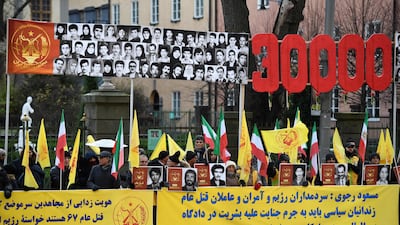A Swedish court on Thursday sentenced a former Iranian official to life in prison for participating in the execution of political prisoners in Iran in the 1980s.
Hamid Nouri, who was arrested at a Stockholm airport in 2019, was charged with war crimes for the mass execution and torture of political prisoners at the Gohardasht prison in Karaj, Iran, in 1988.
Amnesty International put the number executed on government orders at about 5,000, saying in a 2018 report that "the real number could be higher". Iran has never acknowledged the killings.
Nouri, 61, was convicted of a "serious crime against international law" and "murder", the Stockholm district court said in a statement.
"The sentence is life imprisonment."
Swedish prosecutors said Nouri took part in severe atrocities in July-August 1988 while working as an assistant to the deputy prosecutor at the Gohardasht prison outside the Iranian city of Karaj.
"The investigation has shown that the accused, jointly and in collusion with others, participated in the commission of the criminal acts," the court said.
"He has, under an alias and in the role of assistant to the deputy prosecutor, retrieved prisoners, brought them to the committee and escorted them to the execution site."
They said Iran’s supreme leader at the time, Ayatollah Khomeini, had issued an execution order for all prisoners in the country who sympathised with and stayed loyal to the Iranian opposition group Mujahedeen-e-Khalq, known as MEK.
Because of that order, a large number of prisoners were executed in the Gohardasht prison between July 30 and August 16, 1988.
The Swedish prosecutors said Nouri was suspected of “intentionally killing, together with other perpetrators, a large number of prisoners who sympathised with various left-wing groups and who were regarded as apostates”.
"This is not only against Hamid Nouri, this decision is against the whole regime in Iran," Kenneth Lewis, a lawyer for the complainants, said.
"This is a great day for me, a great day for all the victims' families," Mehri Emrani, a 61-year-old MEK supporter who served in prison herself and whose husband was a complainant.
Nouri is the only person so far to face trial over the purge that targeted members of the Iranian People's Mujahideen, which was fighting in parts of Iran, as well as other political dissidents.
He had argued that he was on leave during the period in question, and said he worked in another prison.
His lawyer Thomas Soderqvist said they were "disappointed" and will be appealing.
The trial has focused unwelcome attention on Iran's hardline President Ebrahim Raisi, who is under US sanctions over a past that includes what Washington and activists say was his involvement as one of four judges who oversaw the 1988 killings.
The case has soured relations between the two countries with Iran describing the trial as illegal.
"Sweden should provide the grounds for the release of Nouri as soon as possible," Iranian Foreign Ministry spokesman Nasser Kanaani said on Wednesday.
The Swedish foreign ministry has meanwhile advised its citizens against non-essential travel to Iran.
Concerns have been raised about reprisals against Western prisoners held by Iran. Two Swedish-Iranian citizens are presently on death row.
The main concern is the Iranian-Swedish academic Ahmadreza Djalali who was sentenced to death in Iran in 2017 on espionage charges.
Amnesty International has accused Tehran of holding him "hostage" in an attempt to force an exchange with Nouri.


